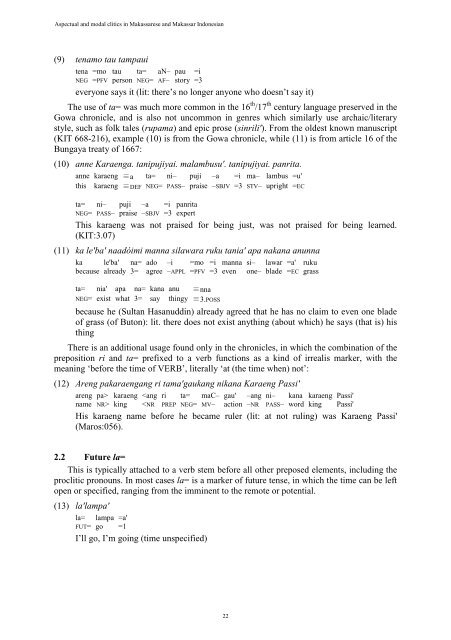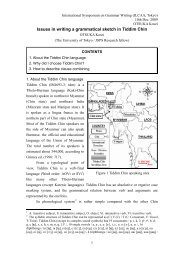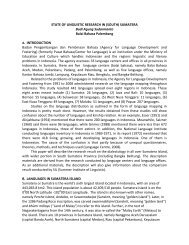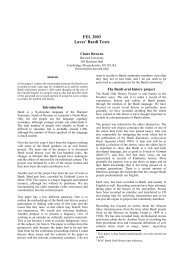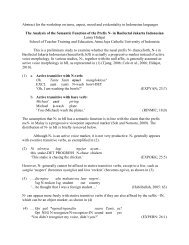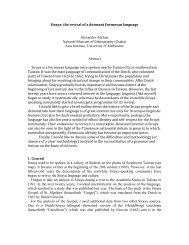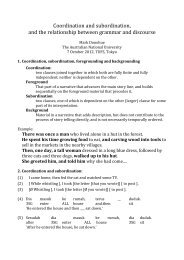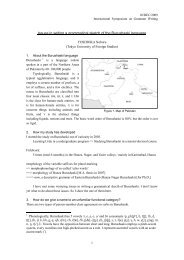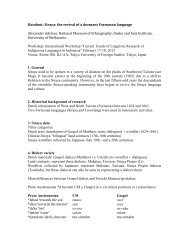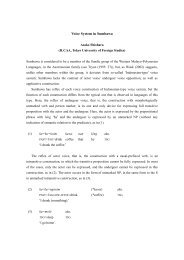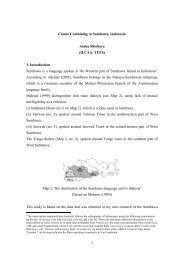Aspectual and modal clitics in Makassarese and Makassar Indonesian
Aspectual and modal clitics in Makassarese and Makassar Indonesian
Aspectual and modal clitics in Makassarese and Makassar Indonesian
You also want an ePaper? Increase the reach of your titles
YUMPU automatically turns print PDFs into web optimized ePapers that Google loves.
<strong>Aspectual</strong> <strong>and</strong> <strong>modal</strong> <strong>clitics</strong> <strong>in</strong> <strong><strong>Makassar</strong>ese</strong> <strong>and</strong> <strong>Makassar</strong> <strong>Indonesian</strong><br />
(9) tenamo tau tampaui<br />
tena =mo tau ta= aN– pau =i<br />
NEG =PFV person NEG= AF– story =3<br />
everyone says it (lit: there’s no longer anyone who doesn’t say it)<br />
The use of ta= was much more common <strong>in</strong> the 16 th /17 th century language preserved <strong>in</strong> the<br />
Gowa chronicle, <strong>and</strong> is also not uncommon <strong>in</strong> genres which similarly use archaic/literary<br />
style, such as folk tales (rupama) <strong>and</strong> epic prose (s<strong>in</strong>rili'). From the oldest known manuscript<br />
(KIT 668-216), example (10) is from the Gowa chronicle, while (11) is from article 16 of the<br />
Bungaya treaty of 1667:<br />
(10) anne Karaenga. tanipujiyai. malambusu'. tanipujiyai. panrita.<br />
anne karaeng ≡a ta= ni– puji –a =i ma– lambus =u'<br />
this karaeng ≡DEF NEG= PASS– praise –SBJV =3 STV– upright =EC<br />
ta= ni– puji –a =i panrita<br />
NEG= PASS– praise –SBJV =3 expert<br />
This karaeng was not praised for be<strong>in</strong>g just, was not praised for be<strong>in</strong>g learned.<br />
(KIT:3.07)<br />
(11) ka le'ba' naadóimi manna silawara ruku tania' apa nakana anunna<br />
ka le'ba' na= ado –i =mo =i manna si– lawar =a' ruku<br />
because already 3= agree –APPL =PFV =3 even one– blade =EC grass<br />
ta= nia' apa na= kana anu ≡nna<br />
NEG= exist what 3= say th<strong>in</strong>gy ≡3.POSS<br />
because he (Sultan Hasanudd<strong>in</strong>) already agreed that he has no claim to even one blade<br />
of grass (of Buton): lit. there does not exist anyth<strong>in</strong>g (about which) he says (that is) his<br />
th<strong>in</strong>g<br />
There is an additional usage found only <strong>in</strong> the chronicles, <strong>in</strong> which the comb<strong>in</strong>ation of the<br />
preposition ri <strong>and</strong> ta= prefixed to a verb functions as a k<strong>in</strong>d of irrealis marker, with the<br />
mean<strong>in</strong>g ‘before the time of VERB’, literally ‘at (the time when) not’:<br />
(12) Areng pakaraengang ri tama'gaukang nikana Karaeng Passi'<br />
areng pa> karaeng k<strong>in</strong>g


